Toronto Film School Celebrates Latin American Heritage Month with Special Panel Discussion
When Mexican filmmaker Guillermo del Toro won his first Oscar for The Shape of Water in 2017, he made a point of praising the film industry for its part in helping to “erase the lines in the sand…as the world tries to make them deeper.”
In honour of Latin American Heritage Month in Canada, Toronto Film School celebrated the remarkable contributions our Latin students, faculty and alumni have made in continuing that tradition with a special panel discussion entitled Culture, Art and the Creative Process.
Hosted by Class of 2018 Film Production valediction and current faculty member Bruno Lyra, the event engaged a panel of current Toronto Film School students and alumni – including 2020 Film Production graduate Guillermo Núñez, 2020 Acting for Film, TV & the Theatre graduate Krista Serrano, and current Video Game Design & Animation Maria Gabriela Tapia – in a discussion about their passion for incorporating their Latin American culture and traditions into their work.
Here are a few excerpts from their 90-minute discussion:
On the Latin American artists in their field that they draw the most inspiration from:
“One of my Latin influences is Luis Estrada. He’s an amazing director. He mostly just does one film every six years, which is the time that the president of Mexico is in power. So, he will touch on subjects of what is happening during those six years. So, he has done La ley de Herodes, La dictadura perfecta, El infierno, and others. And each one of his movies, in my opinion, are masterpieces. There are so many things inside of the movie – in the dialogue, in the production design, in so many elements – that it’s just mind-blowing. You have to watch it again or just repeat the minute four times until you fully understand what’s happening. And I find that amazing and fascinating – what a movie can actually portray to you.”
– Guillermo Núñez
“We have so many (Latin) people that are good in the industry. You have Elsa Pataky, she’s from Spain and has been in Fast & Furious and right now she has a fitness business. You have Salma Hayek…you have Sofia Vergara, you have Antonio Banderas, you have Penélope Cruz. And with all of them, you see how much of an impact they made on their people, on their cultures, on people from their countries. They’ve inspired me to dream.”
– Krista Serrano
“My great inspiration in video games is Vander Caballero (the founder and CEO of Minority Media). He’s a creative director from a company in Montreal and he’s originally from Colombia. He’s been a great inspiration for me because he was able to put all his childhood experience, all his background into his games. He actually uses Brazil as one of his environment inspirations for one of his games, and it was pretty interesting how he portrays all his childhood, all his moments that were really hard, in a really positive way to show the world how nice the world can be. It’s great how he creates memorable moments through playable experiences…You are not sitting, you are not just watching something, you are actually interacting with the world around you and that’s great. Being able to create worlds and show a lot of different things in a world you created for other people to experience is just the best feeling in the world.”
– Maria Gabriela Tapia
On what compelled them to pursue their passions:
“I see filmmaking as part of my activist work, and as a way of portraying my ideas and beliefs. Since a very young age, I knew that I wanted to tell stories. I knew I wanted to express myself. I just didn’t know how…It’s not that I want to be recognized, but I want my stories to be recognized. I want to put a little bit of myself out there somewhere…like a legacy, but not a money legacy – more like a feeling.”
– Guillermo Núñez
“My story started back in Colombia. I graduated from high school and I really didn’t have much idea of what to do with my life after that. The only thing I knew was that I didn’t want to study in my country. Unfortunately, Colombia is still a place, in terms of education, that doesn’t have a lot of opportunities for arts, so my choices were being a lawyer or being a doctor. I didn’t really have a lot of opportunities to be an artist. I’ve always loved art. I’ve been doing art since I can remember. And having this opportunity to go outside and learn about the world showed me that I was able to showcase my talent outside of my country and actually pursue what I really love.”
– Maria Gabriela Tapia
“I was a corporate lawyer for some time before I moved over to film and went to TFS. My initial opportunities were more on the business side, and things worked out really well..and I’m extremely proud of some of the projects that came out of that. But I wanted to get more involved in the creative field – and I have. One of my scripts was recently optioned by a huge production company for a TV series, and two other feature film scripts were sold. It’s been great.”
– Bruno Lyra
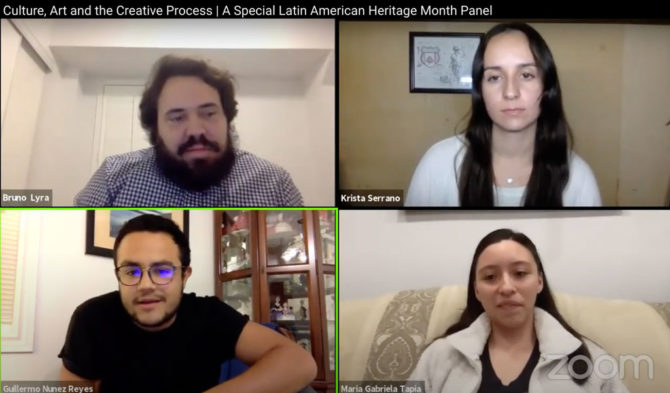
On whether the innate difficulties of being a Latin artist living and working in another culture helps or hinders the artistic process
“I believe that leaving your country is extremely, extremely powerful for your creativeness and for you to feel closer to your country. When I left Mexico in 2016 to go to university, I couldn’t stop thinking about the food and I watched Mexican movies all the time. I didn’t feel that connected to my country until I left it. It gives you a lot of patriotic feelings…
“But here’s also this representation of Latino characters in commercial films, for example, where you can see these demeaning roles – the character either has to be a NARCO or a drug addict or an inmate or a prostitute – because that’s what sells. I know a lot of Mexican actors and they are so sad because they need to leave very good roles, because they don’t want to continue to represent this concept or stigma that we have of Latins…Why can’t Latins be doctors, for example, or engineers, or scientists, lawyers?
“I get a different treatment just because I am Latin…I don’t get offended anymore, but in the beginning, in 2016? Oh my God, I was a ball of fire all the time. And then I understood that it’s not their fault. It’s the fault of what they see. They see Mexico City and they just see this dessert, where it’s actually the second or third biggest city in the world. It’s just ridiculous. So, I started thinking ‘What can I do to make people understand?’ Maybe I can make a movie. Maybe I can make a story that explains it and shows you the reality of my country.”
– Guillermo Núñez
“Breaking into an above-the-line position is very hard if you want to be a screenwriter, a director, a producer, an actor. These are very difficult positions to break into, and certainly being from another culture is, at times, a hindrance, in the sense that people don’t know you, you’re coming from a different perspective, but, as Guillermo pointed out, that also enriches your art. That also enriches the narrative of your stories. That also means that, because you’re coming from a different place to tell your story, there is a unique characteristic that the others won’t have. I would say it’s a challenge, but not an impediment to the progression of your career.
– Bruno Lyra
On having an accent:
“Two things I hear constantly…‘You gotta change your accent or you’re never going to get work’ and ‘If you don’t change your accent, you might get something, but just background roles.’ And that’s the type of mentality I hate, and the mentality I want to change. Because in Mexico, a lot of the time there are projects that are done and people from the US appear in them, people from England, people from Colombia – and not once do they tell them to change their accent. Not once…
“I personally want to work on my dialect and on my accent, but at the same time, I have a lot of internal fights about that, because I don’t want to lose that part of me…and you have people like Salma Hayek. In all her movies, she doesn’t change her accent and look at where she is now, because she never let go of what makes her unique, of what makes her Salma Hayek, and I think that’s something that’s very important for our culture and our people to understand in this industry. You don’t have to turn into anyone else for you to achieve your dreams. You being who you are, you have all these different things for you, you should take it as an advantage, because it puts you in another category. So, yeah, just don’t let go of your culture, don’t let go of your uniqueness – never, never, never.”
– Krista Serrano
“I fully agree with Krista about your accent – it’s so, so important. If you have a strong accent like mine, do not change it. I used to be in a private American school in Mexico, and a lot of people would be, like, ‘Why do you speak like that?’ Because I’m Mexican. I don’t feel like I have to change my accent, I just have to say the words in English, period. In the beginning, it was hard for me to understand why, but then when I came to Canada, I understood – it’s such an advantage. It’s so true. it has opened so many doors, the fact that my accent is unique.”
– Guillermo Núñez
“I’m trying to overcome the English barrier…but Spanish is the way I’ve been living my whole life and keeping my brain Spanish is something that keeps me linked to my culture. Even when I’m far from home and far from my family, being able to continue using my language is important to me…I think it’s great to improve at English, but I want to keep my existence, my thinking in Spanish, in my native language, to express to the world how I think about the world. Sometimes you don’t really feel yourself when you don’t have your language. That happened to me when I first came here. I couldn’t be myself, because I was trying to make everything perfect. But then I realized that this is the best version of me and I don’t have to change that – a really important lesson there.”
– Maria Gabriela Tapia
About the Panelists:
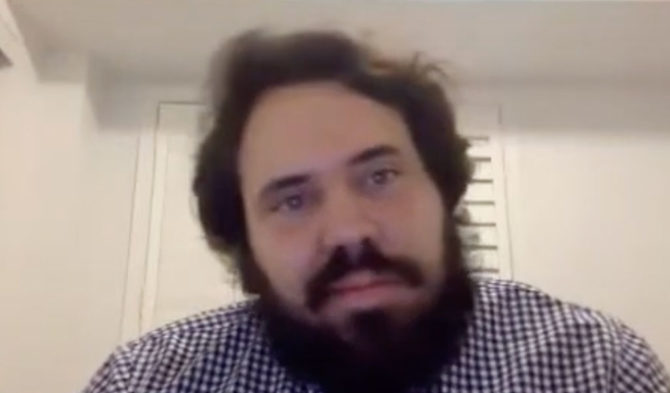
Bruno Lyra
In mid-2016, Lyra, who’s originally from Rio de Janeiro, Brazil, walked away from his successful corporate law career to pursue his passion for film. Since graduating from Toronto Film School, he has dedicated his time to both producing (with projects such as the multiple-award-winning feature film The Sounding, which was sold to HBO in 25 territories, and First Person, which is part of the 2020 Cannes Series) and screenwriting (he’s signed a deal with Blue Ant Media for his show Identities, and his feature film script Reckoning was recently optioned by Carousel Pictures). Bruno has also served as a consultant for several productions and currently teaches Contracts and Copyright in Film at Toronto Film School.
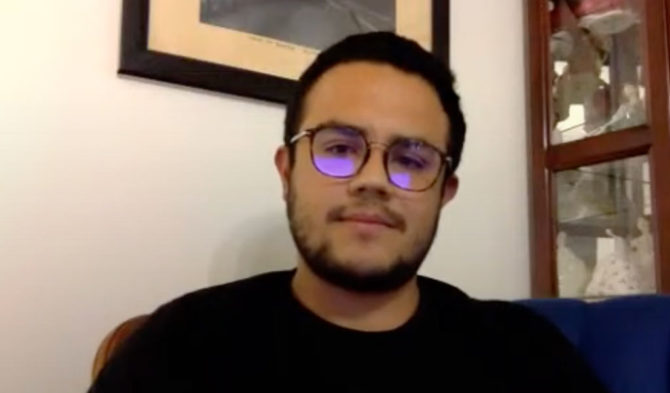
Guillermo Núñez
After living 18 years in México, Núñez decided to come to Canada and experience something new. After two years of studying towards his Bachelor of Business Administration at Yorkville University, he realized that his true passion is film. Having balanced part-time studies and personal projects, he’s been able to pursue his dream of building a career in the film industry.
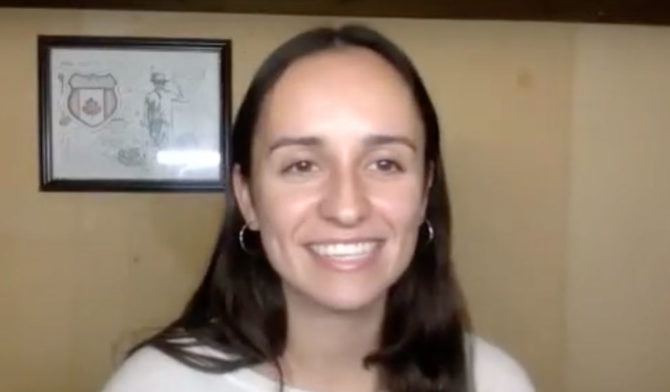
Krista Serrano
Coming from a rich culture of Spanish and Mexican heritage, Serrano decided to start her journey at 17 moving to New Brunswick. Since graduating from the Acting for Film, TV and the Theatre Diploma program, she is now studying in Yorkville University‘s Bachelor of Business Administration program, and enjoying all the opportunities and experiences coming her way, while keeping her Latin culture close to her heart as inspiration for what she wants to achieve.
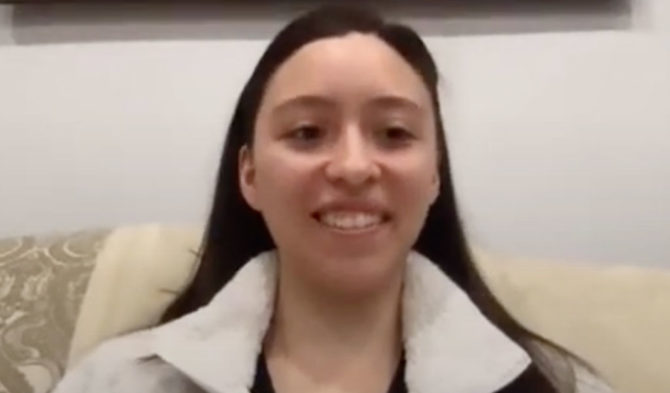
Maria Gabriela Tapia
Maria Gabriela Tapia Nieto started her journey at Toronto Film School with the Video Game Design & Animation program in 2019. She is currently the Design Lead of the capstone project for Spring 2021. She specializes in 3D modelling, including characters and environment, and has proficiency on industry-standard software such as 3Ds Max, Maya, Zbrush and Substance Painter. Currently working on projects with independent developers all around the world, building indie games in genres such as puzzle-platformers, exploration, and shooter games.


